Nowhere are Russia’s footsteps more pronounced today than in the Middle East, its old Soviet stomping grounds, where the locals are increasingly deferential to Putin. The question is what Trump intends to do about the situation, writes Shalom Lipner. This piece originally appeared in The National Interest.
“We’ll always have Paris,” Humphrey Bogart’s Rick tells his old flame Ilsa, played by Ingrid Bergman, in the 1942 classic, Casablanca. But President Donald J. Trump wants a piece of the action too. Returning from the City of Lights last summer, Trump had an epiphany. “I want a parade like the one in France,” he announced to the Pentagon a few months later.
After last Saturday morning’s strike in Syria, benign processions of Western military hardware are now the last thing on anyone’s mind. The combined forces of the United States, U.K. and France launched over one hundred missiles at targets connected to President Bashar al-Assad’s chemical weapons program. One could be forgiven for assuming that this was Trump’s parting shot from the Syrian theater—having already pledged to bring home American troops stationed there—save the claim of French president Emmanuel Macron that he has convinced Trump to remain there for the longer haul.
We’ve come a long way since 2003, when the House of Representatives cafeteria started serving Freedom Fries after France opposed U.S. plans to invade Saddam Hussein’s Iraq. Now, it’s the Elysée Palace goading the White House to stick to its guns against Bashar Assad. One thing remains constant, however: the villain in the script is a stooge for President Vladimir Putin.
The Cold War is playing to sell-out crowds again. Putin’s audacious campaign to influence the outcome of the 2016 U.S. presidential election was just the trailer. Last month, almost thirty countries expelled Russian diplomats when the Kremlin was implicated directly in the poisoning of Sergei Skripal, a former GRU officer turned double agent, and his daughter in the south of England. Moscow retaliated in kind, sending their foreign envoys packing.
But nowhere are Russia’s footsteps more pronounced today than in the Middle East, its old Soviet stomping grounds, where the locals are increasingly deferential to Putin. Just prior to visiting Moscow in July, Iraqi vice president Nouri al-Maliki told an RIA Novosti interviewer that, “if it wasn’t for Russia, the region would have been totally destroyed.” Addressing a Valdai Club conference in the Russian capital in February, Iranian foreign minister Mohammad Zarif lauded Tehran’s “growing, strategic partnership with the Russian Federation, which stems from our common principles, interests and concerns.”
Damascus is the star in the current run of the Russian circus. Iran has invested billions to keep Assad in business, but Putin is the ayatollahs’ enabler. Casting doubt over the deployment of chemical weapons in Douma, Russia’s president accused the United States and its European partners to the weekend’s attack of “cynical disdain.” His foreign minister, Sergey Lavrov, claimed on Friday to have “irrefutable evidence” that the charges against Assad were fabricated by “the special services of the state which is eager to be in the front ranks of the anti-Russia campaign.”
Moscow scrambled fighter jets promptly to defend Syrian skies against the possibility of further aggression by the “criminals,” as Iranian supreme leader Ali Khamenei referred to Trump, Macron and British prime minister Theresa May.
Initially, Trump signaled that he and Putin were destined to become fast friends and colleagues. While visiting Vietnam in November, Trump tweeted that “Russia can greatly help!” in solving issues such as North Korea, Syria, Ukraine and terrorism. But after fifteen months on the job, he now sounds more skeptical. Trump—who only two weeks ago said he thought he “could have a very good relationship with Russia and with President Putin”—is starting to sing a different tune, of mobilizing the White House to “confront destabilizing and malicious behavior by Russia.”
The question is what Trump intends to do about the situation.
In the Middle East, it’s an open secret that the United States has pretty much checked out of the region. A summit planned for Camp David in May has been postponed until September, meaning that the standoff between Qatar and its Persian Gulf neighbors will doubtless continue to fester. After a series of failed UN-sponsored negotiations on Syria, those reins have been seized by Russia, Iran and Turkey, boxing the United States out of the conversation on Syria’s future. Topping matters off, the United States is short dozens of ambassadors at key posts—not to mention a confirmed secretary of state.
Even Israel—whose “biggest friend” Trump professes to be—is feeling America’s absence. In February, an armed, Iranian-operated drone exploited holes in the famed umbrella of U.S. deterrence to penetrate Israeli airspace across the Golan Heights. It’s no coincidence that Israeli prime minister Benjamin Netanyahu engages regularly with Putin to discuss Syria, where Israel’s security measures are processed through a deconfliction mechanism that keeps Israeli and Russian forces from colliding into each other. Israel could become even more reliant upon Russia, if Putin restricts the Israel Defense Forces’ freedom of movement in the wake of the recent attack on Assad.
Where Trump moves next is unclear. The statements which he, May and Macron released on Saturday all emphasized their objective to deter Assad’s use of chemical weapons. NATO expressed its “full support” for the military action as well. But does Trump’s dubious “Mission Accomplished” tweet mean that he feels his work in Syria is now done? If he does, he can be sure that Assad will be back at killing his dependents in short order.
More importantly, what about the more consequential problem of Russian cover for rogue regimes in the Middle East? The White House rushed to reiterate that Trump wants American soldiers back home “as soon as possible.” Reports suggest that Trump’s aides may also have gotten ahead of him in hitting back against Russia. The U.S. Treasury was poised to issue a host of new penalties against Russia entities, but Trump seems to be getting cold feet now. This is no way to put Moscow on notice.
Those who argue that Syria is not a core U.S. interest or that the United States has no good options there are missing the bigger picture entirely. Trump the businessman is looking to subcontract his regional strategy. “Increased engagement from our friends, including Saudi Arabia, the United Arab Emirates, Qatar, Egypt and others, can ensure that Iran does not profit from the eradication of ISIS,” he said after the airstrikes over the weekend. Is it going to be easier for the United States to pick up the broken pieces when his expectations don’t pan out and enemies of America are playing an even stronger, Russian-sanctioned hand?
And is war between Israel and Iran in the interest of the United States? Senior Iranian official Ali Akbar Velayati has promised his country’s retribution against Israel for the February 10 strike in Syria. “The crimes will not remain unanswered,” he told the Islamic Republic News Agency. Not to be outdone, senior Israeli defense officers have indicated that their response could include “a massive counterstrike on Iran’s entire military infrastructure in Syria.” Israel might even decide to preempt if Russia moves to deploy its S-300 surface-to-air missile defense system to Syria. Since the United States would almost certainly engage on behalf of its Israeli ally in such a scenario, and with Iran’s nuclear ambitions in the background, would it not be wiser to intervene beforehand rather than let the Russians manage the bloodletting?
This is a time of few good options, but at the very least, the Trump administration should put down markers—red lines, if you will—to telegraph its intentions. It should play for keeps, like Russia. The U.S. president’s explicit threat to discard the Joint Comprehensive Plan of Action with Iran has sent its European signatories looking for alternatives. An equally credible ultimatum could compel the Russian masters of Syria to respect America’s limits. U.S. ambassador to the UN Nikki Haley warned the Security Council on Saturday that “the United States is locked and loaded” for the event that Bashar Assad uses poison gas again. The key is to not equivocate, or better to have said nothing at all. Waffling undermines confidence in American leadership and financial markets.
Military pageants are good for boosting national morale, but they can’t justify the hefty price tag of maintaining America’s arsenal. Those weapons exist for only one reason: to safeguard U.S. interests in the world. And the best way to achieve that goal in Syria is for Trump to persuade Russia that he won’t hesitate to employ overwhelming force in order to halt Assad’s use of chemical weapons and to eject Iran’s forward presence from the country. Otherwise, Trump can get ready to clean up after the horses when the parade is over.

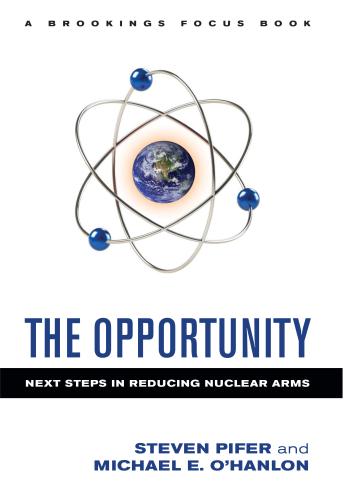
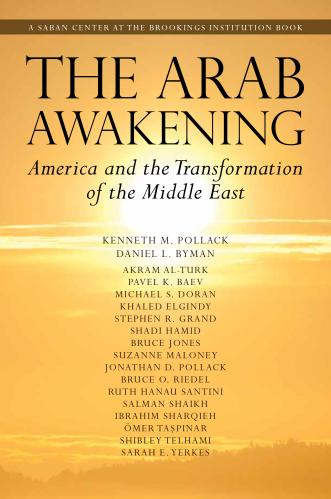
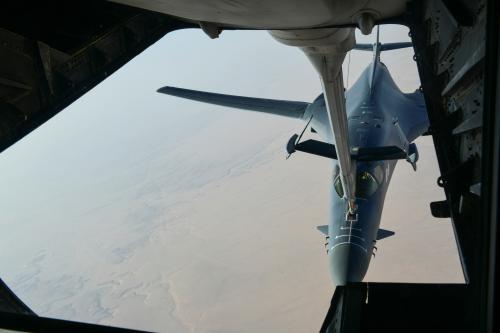
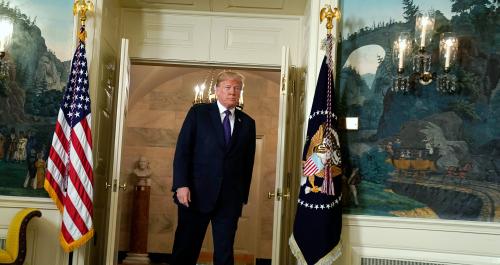
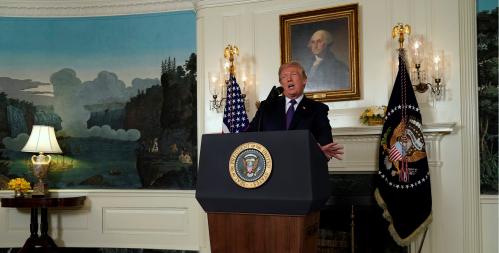
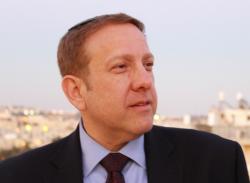
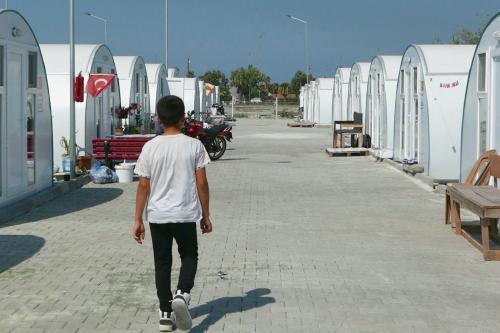
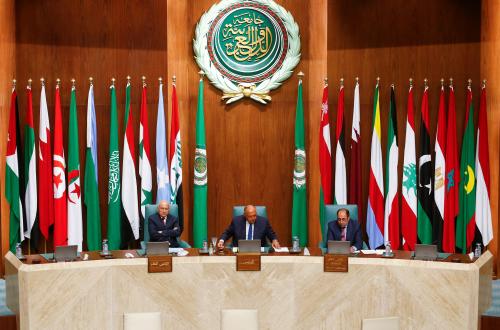
Commentary
Time to show Russia a military parade—In Syria
April 25, 2018